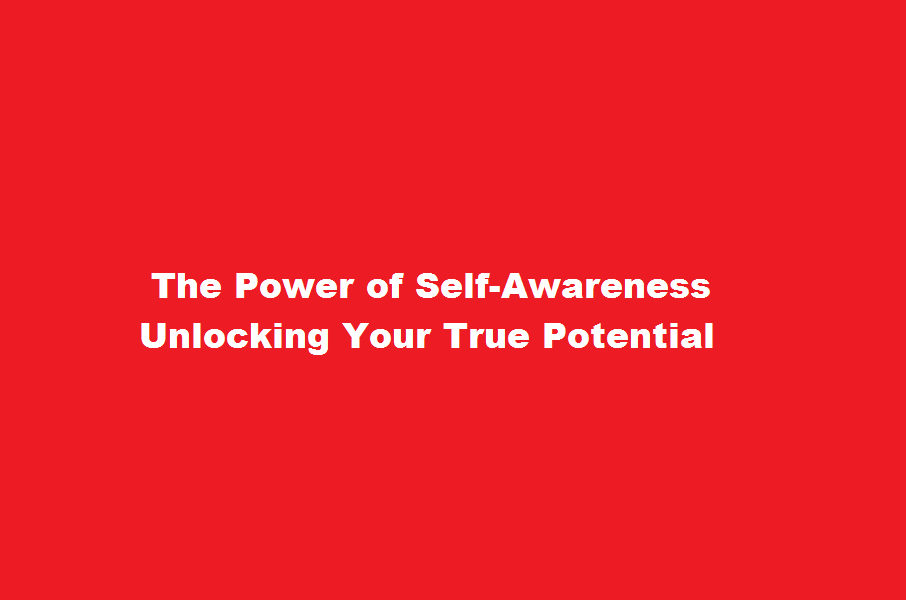The Power of Self-Awareness Unlocking Your True Potential
3 min read
Introduction
In today’s fast-paced and ever-evolving world, it’s easy to get caught up in the daily grind and lose sight of who we truly are. However, cultivating self-awareness is a powerful tool that can help us navigate life with clarity, purpose, and authenticity. By understanding ourselves on a deeper level, we can make better decisions, build meaningful relationships, and lead a more fulfilling life. In this article, we will explore the importance of self-awareness and provide practical strategies to develop and enhance this essential skill.
Understanding Self-Awareness
Self-awareness is the ability to consciously recognize and understand our thoughts, emotions, and behaviours, as well as how they impact ourselves and others. It involves observing ourselves without judgement, acknowledging our strengths and weaknesses, and recognizing our values, beliefs, and motivations. Developing self-awareness requires introspection, reflection, and a willingness to explore our inner world.
Why is Self-Awareness Important?
Self-awareness serves as the foundation for personal growth and development. By knowing ourselves better, we can identify our goals and aspirations, align our actions with our values, and make choices that are authentic and meaningful. It allows us to recognize patterns of behaviour that may be hindering our progress and empowers us to make positive changes.
Self-awareness is also crucial for building healthy relationships. When we understand our own emotions and reactions, we become more empathetic and compassionate towards others. We can communicate effectively, resolve conflicts more constructively, and establish stronger connections based on trust and understanding.
Practical Strategies for Developing Self-Awareness
- Mindfulness Practise being fully present in the moment and non-judgmentally observing your thoughts, emotions, and bodily sensations. Meditation, deep breathing exercises, and mindful activities such as yoga or journaling can help cultivate mindfulness.
- Self-reflection Set aside regular time for self-reflection. Ask yourself thought-provoking questions, such as “What are my core values?” or “What are my strengths and areas for improvement?” Write down your thoughts and insights to gain clarity and deepen your understanding of yourself.
- Seek feedback Ask trusted friends, family members, or mentors for honest feedback about your strengths, weaknesses, and blind spots. Their perspectives can provide valuable insights that may be difficult for you to see on your own.
- Emotional intelligence Develop your emotional intelligence by identifying and labelling your emotions, understanding their triggers, and learning to regulate them effectively. Emotional intelligence enhances self-awareness and enables better decision-making and relationship management.
- Self-assessment tools Utilise personality assessments, such as the Myers-Briggs Type Indicator (MBTI) or the Big Five Personality Traits, to gain insights into your personality, preferences, and tendencies. These assessments can serve as a starting point for self-reflection and personal growth.
- Regular journaling Maintain a journal where you can express your thoughts, feelings, and experiences. Writing can help you process emotions, uncover patterns, and track your personal growth over time.
- Seek diverse experiences Step outside of your comfort zone and expose yourself to new environments, cultures, and perspectives. This broadens your horizons and challenges your preconceived notions, allowing you to gain fresh insights about yourself and the world around you.
Frequently Asked Questions
What are the 3 key issues of self-awareness?
Self-awareness stems from reflecting on three aspects of the ‘Self’:
- ‘I-Self’ – This aspect answers the question, ‘How do I see myself? …
- ‘Me-Self’ – This answers the question of ‘How do others see me? …
- ‘Ideal-Self’ – This answers the question of ‘How do I want others to see me
What are the 4 key aspects of self-awareness?
Key areas for self-awareness include our personality traits, personal values, habits, emotions, and the psychological needs that drive our behaviours.
Conclusion
Becoming self-aware is a lifelong journey that requires commitment and practice. By investing time and effort into developing self-awareness, you can gain a deeper understanding of yourself, enhance your relationships, and make more intentional choices aligned with your true values and aspirations. Remember, self-awareness is not about striving for perfection but rather embracing your authentic self and continuously striving for personal growth and improvement. Embrace the power of self-awareness and unlock your true potential.
Read Also : Cultivating Self-Consciousness Unlocking Personal Growth and Fulfilment






